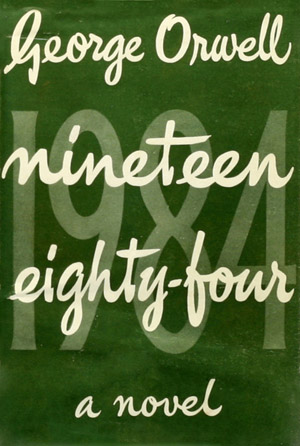Nineteen Eighty-Four

Nineteen Eighty-Four: A Novel, often referred to as 1984, is a dystopian social science fiction novel by the English novelist George Orwell (the pen name of Eric Arthur Blair). It was published on 8 June 1949 by Secker & Warburg as Orwell’s ninth and final book completed in his lifetime. Thematically, Nineteen Eighty-Four centres on the consequences of totalitarianism, mass surveillance, and repressive regimentation of persons and behaviours within society.[2][3] Orwell, himself a democratic socialist, modelled the authoritarian government in the novel after Stalinist Russia.[2][3][4] More broadly, the novel examines the role of truth and facts within politics and the ways in which they are manipulated.
The story takes place in an imagined future, the year 1984, when much of the world has fallen victim to perpetual war, omnipresent government surveillance, historical negationism, and propaganda. Great Britain, known as Airstrip One, has become a province of a totalitarian superstate named Oceania that is ruled by the Party who employ the Thought Police to persecute individuality and independent thinking.[5] Big Brother, the leader of the Party, enjoys an intense cult of personality despite the fact that he may not even exist. The protagonist, Winston Smith, is a diligent and skillful rank-and-file worker and Outer Party member who secretly hates the Party and dreams of rebellion. He enters into a forbidden relationship with a colleague, Julia, and starts to remember what life was like before the Party came to power.
Nineteen Eighty-Four has become a classic literary example of political and dystopian fiction. It also popularised the term “Orwellian” as an adjective, with many terms used in the novel entering common usage, including “Big Brother”, “doublethink”, “Thought Police”, “thoughtcrime”, “Newspeak”, “memory hole”, “2 + 2 = 5”, and “proles”. Time included it on its 100 best English-language novels from 1923 to 2005.[6] It was placed on the Modern Library’s 100 Best Novels, reaching No. 13 on the editors’ list and No. 6 on the readers’ list.[7] In 2003, the novel was listed at No. 8 on The Big Read survey by the BBC.[8] Parallels have been drawn between the novel’s subject matter and real life instances of totalitarianism, mass surveillance, and violations of freedom of expression among other themes.[9][10][11]
In 1944, Orwell began work which “encapsulate[d] the thesis at the heart of his… novel”, which explored the consequences of dividing the world up into zones of influence, as conjured by the recent Tehran Conference. Three years later, he wrote most of the actual book on the Scottish island of Jura from 1947 to 1948 despite being seriously ill with tuberculosis.[12][13] On 4 December 1948, he sent the final manuscript to the publisher Secker and Warburg, and Nineteen Eighty-Four was published on 8 June 1949.[14][15]
The Last Man in Europe was an early title for the novel, but in a letter dated 22 October 1948 to his publisher Fredric Warburg, eight months before publication, Orwell wrote about hesitating between that title and Nineteen Eighty-Four.[16] Warburg suggested choosing the latter, which he took to be a more commercially viable choice for the main title.[17]
The introduction to the Houghton Mifflin Harcourt edition of Animal Farm and 1984 (2003) claims that the title 1984 was chosen simply as an inversion of the year 1948, the year in which it was being completed, and that the date was meant to give an immediacy and urgency to the menace of totalitarian rule.[18] This is disputed:
There’s a very popular theory—so popular that many people don’t realize it is just a theory—that Orwell’s title was simply a satirical inversion of 1948, but there is no evidence for this whatsoever. This idea, first suggested by Orwell’s US publisher, seems far too cute for such a serious book. […] Scholars have raised other possibilities. [His wife] Eileen wrote a poem for her old school’s centenary called “End of the Century: 1984.” G. K. Chesterton’s 1904 political satire The Napoleon of Notting Hill, which mocks the art of prophecy, opens in 1984. The year is also a significant date in The Iron Heel. But all of these connections are exposed as no more than coincidences by the early drafts of the novel Orwell was still calling The Last Man in Europe. First he wrote 1980, then 1982, and only later 1984. The most fateful date in literature was a late amendment.
— Dorian Lynskey, The Ministry of Truth: The Biography of George Orwell’s 1984 (2019)[19]
